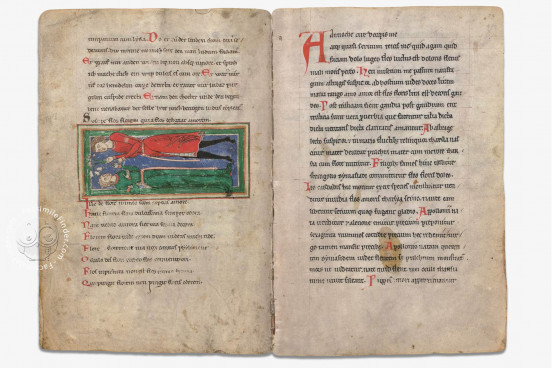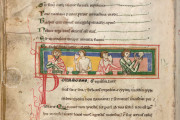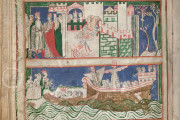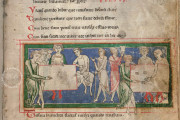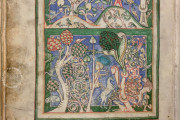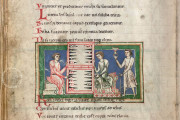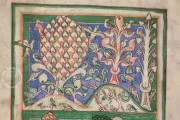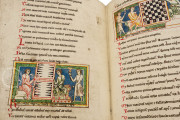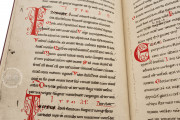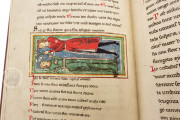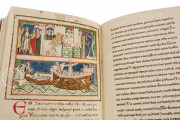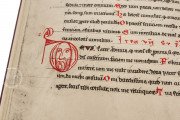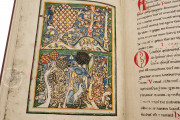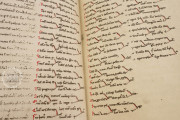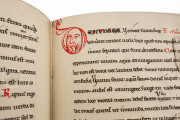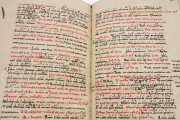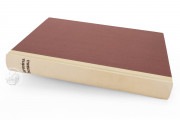The Carmina Burana and Fragmenta Burana manuscripts comprise what was once a single codex of song lyrics and Christian theatrical pieces, many with musical notation. The repertoire was compiled and the manuscript copied in South Tyrol around 1230. It constitutes the most famous witness to medieval Latin love and drinking songs known as "goliardic" and is a cornerstone of medieval music history. The songs—in Latin and Middle High German—address a variety of humorous—even bawdy—and serious themes. The manuscript boasts eight miniatures and dozens of pen-flourished initials, including twelve embellished with human faces.
The script and the style of the paintings are archaic, reflecting the prevailing fashions of the twelfth century. By contrast, the subject of the full-page miniature, a woodland scene without human habitation, is unprecedented (fol. 64v).
Fortune, Drinking, and Gaming
The subjects of the miniatures reflect the themes of the lyrics. The Wheel of Fortune shows the changing circumstances of a king—about to reign, reigning, falling from power, and utterly without power (fol. 1r). One miniature depicts young men drinking, a recurring theme of the songs (fol. 89v), and three miniatures are devoted to games—dice, backgammon, and chess—another frequent theme (fols. 91r, 91v, and 92r).
Compiled by a Learned Lover of Song
A learned person, perhaps a canon of the Augustinian house at Neustift, who appreciated Latin and vernacular poetry, compiled the manuscript's vast collection of song lyrics. They are arranged thematically, starting with moralizing-satirical songs. Then follow love songs, then drinking and gaming songs. The final section is a pair of sacred dramas.
Three scribes were responsible for copying the book's text. The pen-flourished initials include seven with the face of a middle-aged, bearded man—perhaps the main scribe—and five with the face of a young, beardless man—possibly his chief assistant. The scribes may have been the authors of some of the German-language stanzas of Latin songs.
Intended to be Sung
The verses included in the Carmina Burana and Fragmenta Burana were all intended to be sung. Most are strophic in form, with the same music used for many stanzas. Many have stanzas in both Latin and German. About a third of the songs include the melodies written above the texts in neumatic notation, the neumes representing the contour but not the exact pitches of the tunes.
What's in a Name?
The contents of the Codex Buranus—a designation for the original, now divided, book—have been scrambled, not only because of the seven leaves that are now the "fragmenta." The principal Carmina Burana manuscript also reflects changes in ordering and losses. Nevertheless, we now have the complete contents of the Codex Buranus as it survived into the modern period in the two manuscripts in Munich.
The manuscript and its songs owe their names, Buranus and Burana, to the abbey at Benediktbeuern, where the book was found at the time of the monastery's dissolution in 1803 when it entered the collection of the Bayerische Staatsbibliothek.
We have 1 facsimile edition of the manuscript "Carmina Burana and Fragmenta Burana": Carmina Burana facsimile edition, published by Prestel-Verlag, 1967
Request Info / Price
